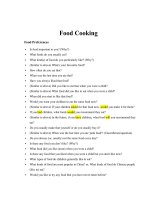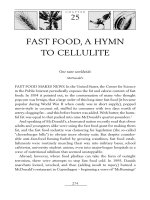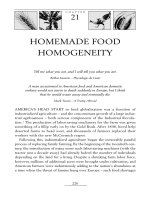318 chinese food
Bạn đang xem bản rút gọn của tài liệu. Xem và tải ngay bản đầy đủ của tài liệu tại đây (312.37 KB, 5 trang )
1.
2.
Chinese stir-fried beef in a wok
Chinese Fried noodles
Chinese Stir Fry Vegetables in a
Wok
Sweet and Sour Pork
4.
Fried noodles
Thai Green Curry
Fortune Cookie
3.
Roasted Peking Duck
5.
6.
Noodle with minced meat
Fried Rice noodles
Peking Duck Pancakes
8.
Steamed dimsum
Stir Fried Shrimp And Broccoli
Double Cooked Pork
7.
Shrimp Chili Sauce
Spring rolls
12.
9.
10.
11.
15.
13.
14.
1. General Chinese Cooking Principles:
•
•
•
Try to vary the meat and vegetables in a dish, so that there is an interesting
variety of flavors, textures, and colors. The Chinese believe it is important
to find balance and harmony in every aspect of life, including food.
Fresh is best: always use fresh ingredients when possible.
Be sure to have everything prepared before you start cooking: the
vegetables washed, drained and cut; the meat cut and marinated; the sauces
prepared.
2. Chinese Cooking Equipment:
•
•
While you don't absolutely need one, a wok is the one piece of cooking
equipment you may want to purchase before you start cooking Chinese food.
While it's nice to own one, you don't need a cleaver to cook Chinese food.
3. Preparing Vegetables:
•
Wash green, leafy vegetables ahead of time. This gives them more time to
drain so they will not be too wet when you stir-fry.
•
Place all the cut vegetables on a tray or cooking sheet. That way,
you won't forget anything. Just be careful not to mix them up, as
cooking times will vary among vegetables.
4. Stir-frying Vegetables:
•
•
When stir-frying vegetables, cook the toughest and thickest vegetables for
a longer period than the softer, leafy vegetables. Vegetables such as
broccoli, carrots, and cabbage need to be cooked longer than bok choy,
which in turn is cooked longer than snow peas or bean sprouts.
If you are uncertain in which order to cook vegetables, simply stir-fry them
separately. Never overcook.
5. Tofu (Bean Curd):
•
For stir-frying or deep-frying, use firm or extra-firm tofu. Firm tofu will
keep its shape and not fall apart in the wok.
•
Drain the tofu before using, as this allows it to absorb the other flavors in
the dish.
6. Meat and Fish:
•
•
•
•
•
•
Always marinate fresh meat.
If a marinade calls for cornstarch, add it last. It will act as a binder.
Always cut beef across the grain. This helps make it more tender.
Cut the meat into uniform pieces so that it will cook more evenly.
When cooking meat or poultry, make sure that the wok is very hot before
adding the food.
If preparing stir-fried meat and vegetables, stir-fry the meat first and set
it aside. Usually you will return it to the wok with a sauce during the final
stages of cooking.
7. Cooking With Oil:
•
•
When adding oil for stir-frying, drizzle the oil down the sides of the wok.
When deep-frying, to tell if the oil is hot enough, simply stick a chopstick in
the wok. When the oil sizzles all around it, you can begin adding the food.
8. Sauce and Seasoning Tips:
•
•
•
•
Always use fresh ginger, not powdered.
If desired, use sugar as a substitute for MSG (Monosodium Glutamate).
The formula for mixing cornstarch and water is 1 to 2 or 1 to 4: for example,
1 tablespoon of cornstarch with 2 tablespoons of water.
Don’t use more cornstarch than called for in the recipe
9. Rice:
•
For best results when cooking rice, use long grain rice.
•
When making fried rice, use cold cooked rice, preferably at least one day
old.
Adapted from:
/>
1. What do the Chinese believe?
_______________________________________________________________
_______________________________________________________________
2. What do you need to purchase before you start cooking Chinese food?
_________________________________________________________________
_________________________________________________________________
3. Why is it so important not to mix up vegetables before stir-frying?
_________________________________________________________________
_________________________________________________________________
4. What kind of tofu is used in stir-frying. Why?
_________________________________________________________________
_________________________________________________________________
5. What should you always do with fresh meat?
_________________________________________________________________
_________________________________________________________________
6. How is meat cut? Why?
_________________________________________________________________
_________________________________________________________________
7. How will you tell when the oil is hot enough?
_________________________________________________________________
_________________________________________________________________
8. Write one seasoning tip.
_________________________________________________________________
_________________________________________________________________
9. What kind of rice is used for fried rice?
_________________________________________________________________
_________________________________________________________________









